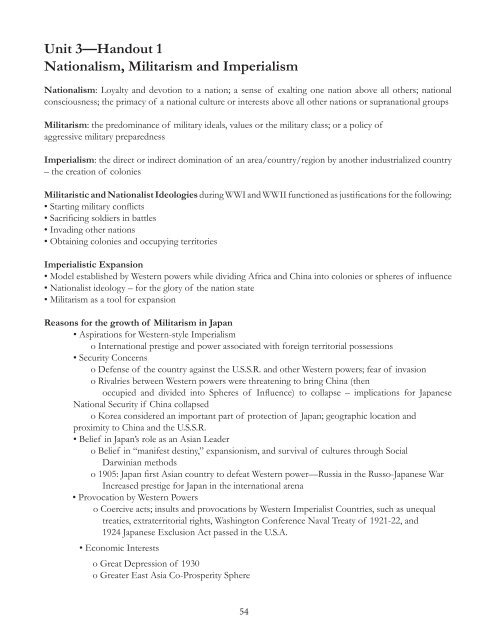Download - Canada ALPHA
Download - Canada ALPHA
Download - Canada ALPHA
Create successful ePaper yourself
Turn your PDF publications into a flip-book with our unique Google optimized e-Paper software.
Unit 3—Handout 1<br />
Nationalism, Militarism and Imperialism<br />
Nationalism: Loyalty and devotion to a nation; a sense of exalting one nation above all others; national<br />
consciousness; the primacy of a national culture or interests above all other nations or supranational groups<br />
Militarism: the predominance of military ideals, values or the military class; or a policy of<br />
aggressive military preparedness<br />
Imperialism: the direct or indirect domination of an area/country/region by another industrialized country<br />
– the creation of colonies<br />
Militaristic and Nationalist Ideologies during WWI and WWII functioned as justifi cations for the following:<br />
• Starting military confl icts<br />
• Sacrifi cing soldiers in battles<br />
• Invading other nations<br />
• Obtaining colonies and occupying territories<br />
Imperialistic Expansion<br />
• Model established by Western powers while dividing Africa and China into colonies or spheres of infl uence<br />
• Nationalist ideology – for the glory of the nation state<br />
• Militarism as a tool for expansion<br />
Reasons for the growth of Militarism in Japan<br />
• Aspirations for Western-style Imperialism<br />
o International prestige and power associated with foreign territorial possessions<br />
• Security Concerns<br />
o Defense of the country against the U.S.S.R. and other Western powers; fear of invasion<br />
o Rivalries between Western powers were threatening to bring China (then<br />
occupied and divided into Spheres of Infl uence) to collapse – implications for Japanese<br />
National Security if China collapsed<br />
o Korea considered an important part of protection of Japan; geographic location and<br />
proximity to China and the U.S.S.R.<br />
• Belief in Japan’s role as an Asian Leader<br />
o Belief in “manifest destiny,” expansionism, and survival of cultures through Social<br />
Darwinian methods<br />
o 1905: Japan fi rst Asian country to defeat Western power—Russia in the Russo-Japanese War<br />
Increased prestige for Japan in the international arena<br />
• Provocation by Western Powers<br />
o Coercive acts; insults and provocations by Western Imperialist Countries, such as unequal<br />
treaties, extraterritorial rights, Washington Conference Naval Treaty of 1921-22, and<br />
1924 Japanese Exclusion Act passed in the U.S.A.<br />
• Economic Interests<br />
o Great Depression of 1930<br />
o Greater East Asia Co-Prosperity Sphere<br />
54


